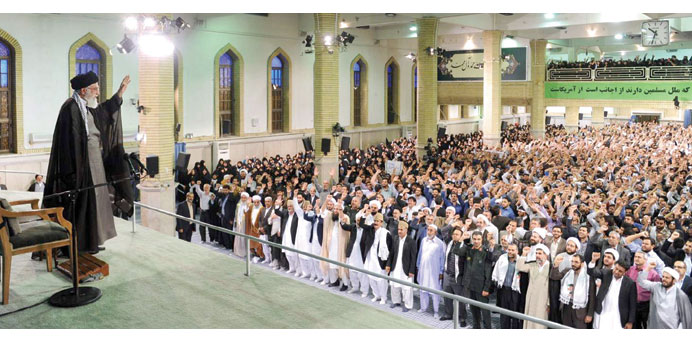A handout photo provided by the office of Iran’s Supreme Leader Ayatollah Ali Khamenei shows him waving to people during a meeting in Tehran yesterday.
Agencies
Tehran
Iran’s Supreme Leader Ayatollah Ali Khamenei said yesterday that he would not permit negotiations with the United States beyond those that culminated in a nuclear deal with world powers in July.
“We allowed negotiation with the US only on the nuclear issue for certain reasons,” Khamenei said in a speech. “In other areas we did not and will not allow negotiations with the US.”
The comments appeared to contradict more moderate president Hassan Rouhani, who said on Tuesday the Islamic Republic was ready to hold talks with the United States on ways to resolve Syria’s civil war.
Khamenei charged that Washington only sought talks on a broader range of issues in a bid to impose its own policies on Tehran.
“US officials seek negotiation with Iran. Negotiation is a means of infiltration and imposition of their will,” he said.
“The Iranian nation expelled this Great Satan, we barred their direct access and now we must not allow their indirect access and infiltration.”
The comments from Khamenei, who has the final say on all matters of state in Iran, came after the US Congress began debate on Tuesday on the nuclear agreement reached with Iran.
President Barack Obama has just enough support in the US Senate to prevent the deal being blocked.
But a majority of lawmakers oppose the deal, backing Israeli claims that it does not do enough to prevent any possibility of Iran developing a nuclear weapon.
Iran rejects Israel’s right to exist, a stance Khamenei reiterated yesterday.
“God willing, there will be no such thing as the Zionist regime in 25 years’ time,” the Iranian leader said.
“In the meantime, the spirit of struggle and jihad will not leave the Zionists a moment’s peace.”
Israeli Prime Minister Benjamin Netanyahu has been a vociferous opponent of the Iran deal, calling it a threat to his country’s existence.
Iran has always denied any ambition to acquire a nuclear weapon and Khamenei has himself said repeatedly that any such policy would be a violation of Islam.
Following the nuclear deal between Tehran and world powers, several high diplomatic delegations from Europe have visited Iran, in a possible sign of a thaw after a decade of isolation brought on by international sanctions.
But long-time rivals Tehran and Washington have yet to normalise relations or open a dialogue on their contending policies in the war-torn region.
A rebellion by conservative Republicans in the US House of Representatives yesterday delayed the first congressional vote on the nuclear agreement and raised the possibility that lawmakers might never vote on a resolution disapproving of the pact.
The House was supposed to vote on a procedural motion to begin debate yesterday, but it was put off after some Republicans said they wanted to push Obama to provide more information about the deal.
Instead, House Republican leaders scheduled a late afternoon meeting to discuss how to proceed.
Under a law Obama signed in May, Congress has until September 17 to vote on a resolution of disapproval of the agreement.
Obama has secured enough votes from his fellow Democrats to sustain a veto of the measure, even if the Republican-led Congress approves it.
The rebel Republicans, led by Representative Peter Roskam, said the Obama administration had not provided all the information about the deal required under the Iran Nuclear Review Act. They said it includes “secret side deals” about inspections of Iran’s nuclear facilities that have not been fully revealed.
The White House dismissed that suggestion.
“If Congress does not vote, this agreement goes into effect. It’s as simple as that,” White House spokesman Eric Schultz said.
Clinton supports agreement with Tehran
Democratic presidential frontrunner Hillary Clinton expressed firm support yesterday for the nuclear accord with Iran, calling it flawed but still strong.
Clinton added that the agreement must be strictly enforced and said that if elected president next year, she would not hesitate to use military force if Iran fails to live up to its word and tries to develop a bomb.
“Is it perfect? Well, of course not,” Clinton said in a speech at the Brookings Institution. “No agreement like this ever is. But is it a strong agreement? Yes, it is.”
The former secretary of state added: “Either we move forward on the path of diplomacy and seize this chance to block Iran’s path to a nuclear weapon. Or we turn down a more dangerous path leading to a far less certain and riskier future. That’s why I support this deal.”
She added that the accord is positive for the security of Israel, which vehemently opposes it.
Largely echoing the position the Obama administration has held for months, Clinton insisted America would never let the Iranians develop a nuclear weapon.
“As president, I will take whatever action is necessary to protect the United States and our allies. I will not hesitate to take military action if Iran attempts to obtain a nuclear weapon,” she said.
She added that the United States should be prepared to reimpose sanctions against Tehran, unilaterally if necessary.
As top US diplomat from 2009 to 2013, Clinton played a key role in Obama’s policy toward Iran, which blended toughness with negotiation.
In particular she was at the forefront of the adoption in 2010 of stinging UN economic sanctions against Iran.
Since it was signed on July 14 in Vienna Clinton has expressed her support for the accord but stressed that this was just the beginning of a long process.

